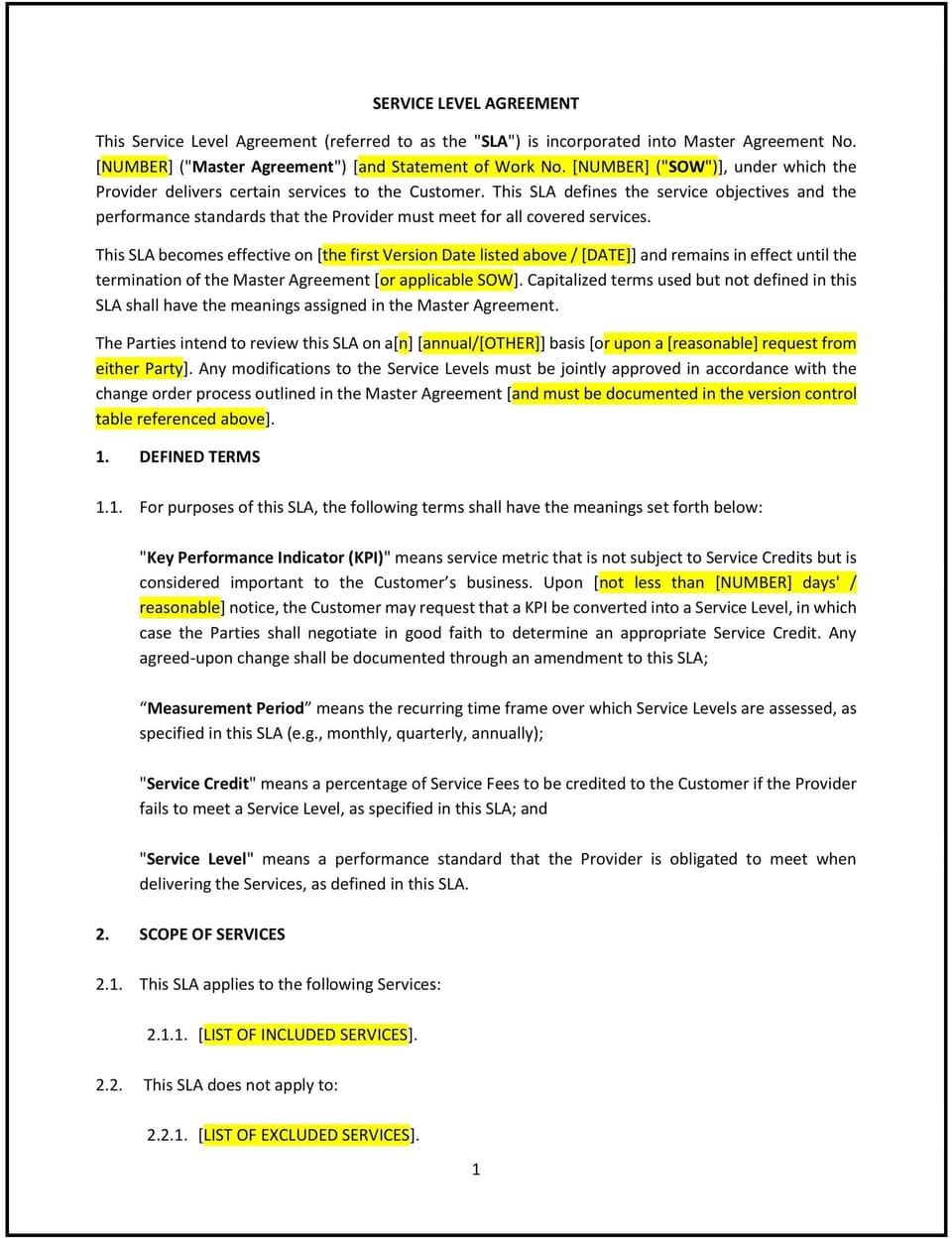Service Level Agreement (SLA) (Wisconsin): Free template

Service Level Agreement (SLA) (Wisconsin)
A Service Level Agreement (SLA) in Wisconsin is a legally binding contract that establishes the expectations, service standards, and responsibilities between a service provider and a client. This agreement ensures that both parties clearly understand the scope of services, performance benchmarks, response times, and consequences for failing to meet obligations. SLAs are widely used in industries such as IT services, cloud computing, managed services, consulting, and maintenance contracts.
Wisconsin follows general contract law principles for enforcing SLAs. While the state does not impose specific SLA regulations, businesses operating in regulated industries such as healthcare, finance, or telecommunications must comply with relevant federal and industry-specific laws. A well-structured SLA helps prevent disputes, ensures accountability, and provides legal protection for both parties.
Tips for drafting and maintaining a Service Level Agreement in Wisconsin
- Clearly define the scope of services, including specific performance obligations, deliverables, and service limitations to avoid ambiguity.
- Establish measurable performance metrics such as uptime guarantees, response times, and resolution deadlines to hold service providers accountable.
- Outline client responsibilities, such as providing access to systems, data, or cooperation needed for the provider to meet service levels.
- Specify penalties, service credits, or contract termination rights if the provider fails to meet performance standards. Wisconsin law allows businesses to freely negotiate these terms.
- Include a dispute resolution mechanism, specifying whether conflicts will be resolved through Wisconsin courts, arbitration, or mediation. Arbitration is often preferred for efficiency.
- Address confidentiality and data security concerns, especially if the provider handles sensitive information. Wisconsin businesses must comply with federal data protection regulations where applicable.
- Regularly review and update the SLA to reflect evolving business needs, technology advancements, or regulatory changes.
Frequently asked questions (FAQs)
Q: What should Wisconsin businesses include in a Service Level Agreement?
A: The agreement should outline service scope, performance standards, penalties for non-compliance, client responsibilities, dispute resolution procedures, and termination clauses.
Q: How does a Service Level Agreement benefit businesses in Wisconsin?
A: It provides clear service expectations, improves service provider accountability, reduces disputes, and offers structured remedies for service failures.
Q: Are service credits enforceable in Wisconsin SLAs?
A: Yes, service credits are a common form of compensation for service failures and are enforceable if explicitly stated in the contract.
Q: What happens if a service provider does not meet SLA requirements in Wisconsin?
A: Clients may be entitled to service credits, refunds, or contract termination, depending on the SLA terms. In severe cases, legal action may be necessary.
Q: How should Wisconsin businesses handle SLA disputes?
A: The SLA should specify a dispute resolution method, such as negotiation, mediation, arbitration, or litigation in Wisconsin courts.
Q: Are verbal SLAs enforceable in Wisconsin?
A: While verbal agreements may be legally binding in some cases, a written SLA offers stronger legal protection and ensures clear terms for both parties.
Q: Can a business modify an SLA after it is signed in Wisconsin?
A: Yes, but any modifications require mutual agreement and should be documented in writing to prevent disputes.
This article contains general legal information and does not contain legal advice. Cobrief is not a law firm or a substitute for an attorney or law firm. The law is complex and changes often. For legal advice, please ask a lawyer.


